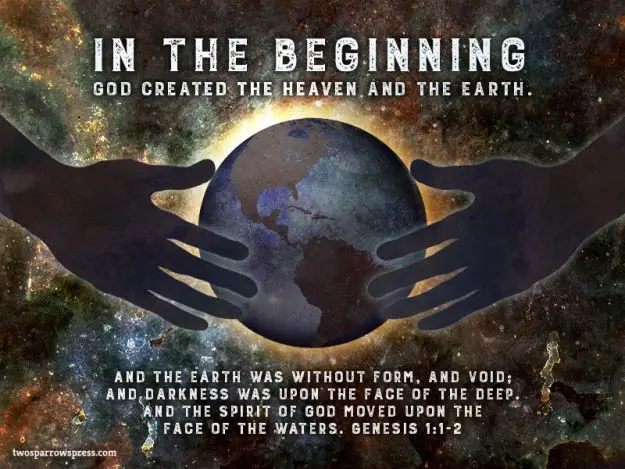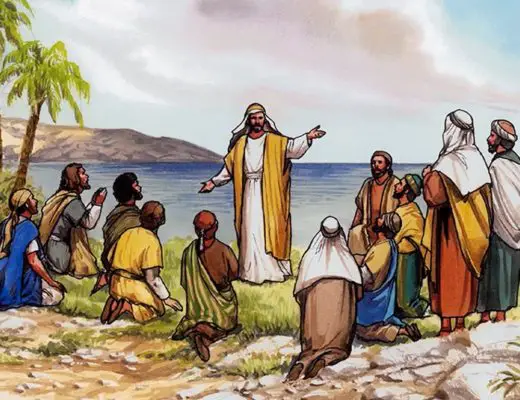In the beginning, God created the heavens and the earth. The earth was without form and void, and darkness was over the face of the deep. And the Spirit of God was hovering over the face of the waters.
Genesis 1:1-2
Ancient Near East Creation Myths
Two launchpads for meditation. The first considers the claim that the Genesis creation accounts borrow from similar ancient near eastern accounts of creation. To briefly explore this topic, I simply want to compare Genesis 1 to the Babylonian epic of creation, the Enuma Elish.
In the Enuma Elish, we read that “He [Marduk] divided the monstrous shape [Tiamat] and created wonders (from it). He sliced her in half like a fish for drying: Half of her he put up to roof the sky, One half of her he set up and stretched out as the heavens. Her waters he arranged so that they could not escape.”
In the Enuma Elish, which is sometimes superficially compared to the Genesis accounts of creation, we read about how creation emerges from a battle of the gods. Marduk defeats Tiamat and uses her sliced-up body to form creation, arranging her waters so that they cannot escape.
Admittedly, there are at least two similarities between this passage in the Enuma Elish and Genesis 1. First, waters that are controlled by the creator are mentioned. In the Enuma Elish, it is the waters flowing from half of Tiamat’s body. In Genesis 1, it is the dark and deep waters that God brings light and order to. Second, the theme of separation is present. In the Enuma Elish, there is separation based upon the two halves of Tiamat’s body. In Genesis 1, there is separation of light and darkness, the waters above from the waters below, and the dry land from the sea.
However, there are tremendous differences. In Genesis 1, God does not battle another deity but is in complete control. Creation is not the result of a battle of the gods. God simply speaks things into existence. The portrait of God from Genesis 1 is entirely different than who the creator is in the Enuma Elish.
As argued by Kenneth Matthews in his two-volume commentary on Genesis, “Instead of a borrowing or a historicizing of ancient myth, it is fairer to say that Genesis comes closer to a repudiation of pagan ideas about origins, mankind, civilization, and the flood.”
While there are similarities between the Genesis accounts and the Mesopotamian creation myths, it would be strange if there were not similarities. God communicates to his people in a way that they can understand. The author of Genesis finds himself within the cultural river of the Ancient Near East. But rather than going along with the current, we find him swimming upstream, describing a view of God very different than the views of the polytheistic world around him.
The Genesis creation accounts would have reshaped the Israelites views away from the many Mesopotamian gods to the one true God. Through the creation narratives, the Israelites (and hopefully us too!) learn that there is only one true God who is in complete control, who rules over everything, who blesses humanity, and who ultimately cares for his good creation.
Chaotic Waters in the Bible
In this second launchpad for meditation, we consider one aspect of God acting in creation: calming the chaotic waters. In the second verse of Genesis, we come across the words “without form,” “void,” “darkness,” “the deep,” and “the waters” – all terms used later in Scripture to describe some form of chaos. But later in Genesis 1, we read about how God establishes order – creating dry ground on which life can flourish.
Genesis 1 and 2 form the start of the story arc of the Bible, so we will briefly trace this theme of God’s control over the sea all the way to Revelation.
Arguably the most well-known account of God’s control over the waters is found in the Israelites’ escape from Egypt. Exodus 14:21-22 reads “Then Moses stretched out his hand over the sea, and all that night the Lord drove the sea back with a strong east wind and turned it into dry land. The waters were divided, and the Israelites went through the sea on dry ground, with a wall of water on their right and on their left.”
Although Moses stretches out his hand, it is ultimately God who separates the waters and creates dry land from the midst of the sea (just like God did in Genesis 1). In Genesis 1, God creates dry ground on which life can flourish, and in Exodus 14, God creates dry ground so that the Israelites can stay alive. God rescues His people through the chaotic waters while causing Israel’s enemies to be overwhelmed by the waters. In Exodus 15, the Israelites sing about this: “The deep waters have covered them; they sank to the depths like a stone. Your right hand, Lord, was majestic in power. Your right hand, Lord, shattered the enemy.”
Fast-forwarding to the New Testament, in Luke 8 we read about Jesus rebuking the wind and the raging waters. In their fear and amazement, the disciples ask, “Who is this? He commands even the winds and the water, and they obey him.” By calming the chaotic waters, Jesus demonstrates that He is God – for only the Creator has control over creation. The Creator speaks and His creation listens, just as we read in Genesis and Exodus.
Luke 8 also has parallels with the story of the escape from Egypt. In Exodus, God controls the waters of the Red Sea to save His people Israel while in Luke God controls the storm to save His disciples, the new people of God.
Lastly in Revelation 21, we read about how in the new creation, there will no longer be any tears, death, mourning, crying, pain, and (curiously) no longer any sea. In this poetic description of the new creation, God has completely removed the chaos that brings danger to His creation throughout the rest of the Bible.
So amidst the chaos of your life and the chaos of this world, find hope in knowing that God is in control.



